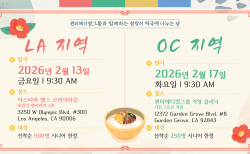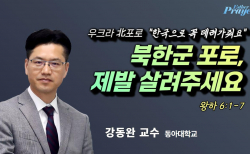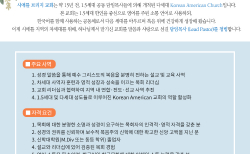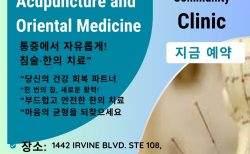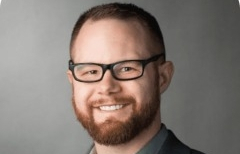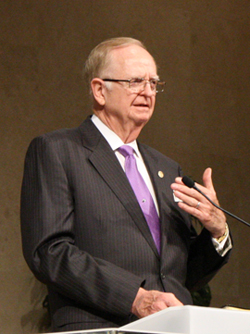
골든게이트 신학대학원 전 총장인 윌리엄 O. 크루즈 박사(William O. Crews)는 10월 10일 글로벌다민족선교본부 주최로 뉴비전교회에서 개최된 5회 글로벌 다민족 선교대회에서 "다리를 만들 것인가, 장벽을 만들 것인가?"란 제하로 강연했다.
크루즈 박사는 요한복음 4장 27-38절을 본문으로 사마리아 여인 앞에 선 "다리를 만드는 자"로서의 예수, "장벽을 만드는 자"로서의 제자들의 자세를 대비하며, 하나님 나라에 속한 기독교인들은 나라 밖에 있는 이들에게 '장벽'이 아닌 '다리'를 만드는 자가 되어야한다는 권고했다.
크루즈 박사는 성경본문을 주해하며, 다리를 만들기 위해서는 세 가지 자세가 요청된다고 말했다.
첫째, 우리를 제약하고 있는 편견을 제거해야한다. (27-30절)
둘째, 우리를 다스릴 수 있는 열정에 우리 자신을 헌신해야한다. (31-34절)
셋째, 우리를 충동질하는 긴급성에 따라 행동해야한다. (35-38절)
크루즈 박사 이번 강의개관을 편집해 게재한다. (편집자 주)
"Buidling Bridges or Barriers?"
John 4:27-38
Introduction:
He declared himself, THE EMPEROR OF THE UNITED STATES AND THE PROTECTOR OF MEXICO. His name was Joshua Norton. Biographers said that he was “eccentric”, or we might say, “He’s a nut!” In 1869, he submitted a proclamation ordering a bridge to be built that would link San Francisco to Marin County. Norton was the laughing stock of San Francisco.
Approximately fifty years later, another visionary believed that the bridge could be built and furthermore, he was the person who could do it. There were many reasons why it could not be done: a span of over a mile separated San Francisco and Marin County; 80 mph winds, 50 foot waves, severe tides and the area of one of the most devastating earthquakes in US history. But Joseph Strauss would not be denied. He drew the plans and began to convince people that it could be done. He even stated that if the cost of the project exceeded his estimate, he would pay the difference himself.
Construction began in January, 1933 and fours years later in April, 1937, the impossible happened and the Golden Gate Bridge was opened. Having lived in Marin County for almost twenty years, I have experienced the vision and commitment of Joseph Strauss by crossing the Golden Gate Bridge often. The Bay Area where you live is marked by a number of bridges that facilitate travel between the communities that make up the San Francisco Bay Area.
The text for this morning is the familiar story of the journey of Jesus and his disciples from Jerusalem to Galilee. As you would know from your study of Scripture, the normal path would have taken Jesus and his company on a longer route, bypassing the region occupied by the Samaritans. Nothing is Jesus’ life was accidental and the path chosen by Jesus for the current journey was for a specific reason, The verses from John 4 leading up to our text tells the beautiful story of Jesus’ encounter with a woman at a Jacob’s well. Beginning with verse 27, we observe the return of Jesus’ disciples from the little village of Sychar. It is in this context that we see the contrasting ways in which Kingdom citizens relate to those outside the Kingdom of God. Jesus was a “BRIDGE BUILDER” while the disciples were “BARRIER BUILDERS.”
The question I pose to us today is: ARE WE BRIDGE BUILDERS (LIKE JESUS) OR BARRIER BUILDERS (LIKE THE DISCIPLES.) I suppose we would all say that we want to be like Jesus and build bridges to those who live outside the Kingdom of God. If so, what needs to happen in our lives?
To be a Bridge Builder…
I. WE MUST ELIMINATE THE PREJUDICES THAT BLIND US. Vs. 27-30
“At this point His disciples came, and they marveled that he had been speaking with a woman; yet no one said, ‘What do you seek?’ or ‘Why do you speak with her?’”
Exegesis:
Three things bothered the disciples: the person Jesus was talking to was a woman; she was a Samaritan woman; and she was the wrong kind of woman, a prostitute.
Jewish rabbis said, “Let no man talk with a woman in the street, no, not even his own wife.” Another said, “It would be better for the law to be burned than delivered into the hands of a woman.” The Jewish male was taught to pray, “Blessed art thou, O Lord, who hast not made me a woman.”
While we may be quick to judge the disciples for their apparent prejudice, we should do what Jesus suggested when he said that before we try to get the speck out of a brother’s eye, we should do something about the log in our own eye.
While our prejudices may not be racially motivated, there are many others that blind us to becoming the bridge builders the Kingdom of God deserves.
If we would be a bridge builder, rather than a barrier…
II. WE MUST COMMIT OURSELVES TO A PASSION THAT WOULD CONTROLS US. VS. 31-34
“In the meanwhile the disciples were requesting him, saying, Rabbi, eat.’ But he said to them, ‘I have food to eat that you do not know about.’ The disciples were saying to one another, ‘No one brought him anything to eat, did he?’ Jesus said to them, ‘MY FOOD IS TO DO THE WILL OF HIM WHO SENT ME, AND TO ACCOMPLISH HIS WORK.”
Exegesis:
The absence of physical hunger could only be explained in spiritual terms. The KEY to Jesus life was HIS SUBMISSION
TO THE WILL OF HIS FATHER. The mission of Jesus’ life was to seek and save those who were lost. Having done just that with the Samaritan woman, he was no longer hungry.
William Barclay said, “Jesus is the only person in the world who never did what he liked, but who always did what God liked. In the Gospel of John, it is said no less than 44 times that Jesus “WAS SENT BY GOD.”
Charles Spurgeon was right when he said that a man has hardly felt the power of eternal things unless at times he forgets earthly matters. GREAT TASKS HAVE A WAY OF LIFTING A PERSON ABOVE AND BEYOND BODILY NEEDS.
Have you ever watched the intensity of the fisherman when the fish were biting? Or perhaps you have stood by the bedside of a sick child and the intensity of the moment caused all physical appetites to fade away.
WHAT PLACE DOES THE WILL OF GOD PLAY IN YOUR LIFE?
We need the passion of Uncle Buddy Robinson, a Presbyterian circuit-riding preacher in the Cumberland mountains. Uncle Buddy prayed:
“O Lord, give me a backbone as big as a saw log; put iron shoes on me and galvanized britches, and hang a wagon-load of determination up in the gable end of my soul, and help me to sign a contract to fight the Devil as long as I have vision, and bite him as long as I have a tooth, and then, dear God, help me gum him till I die!”
If we would be a bridge-builder rather than a barrier builder…
III. WE MUST ACT WITH AN URGENCY WHICH COMPELS US., vs. 35-38
“Do you not say, ‘There are yet four months, and then comes the harvest?’ Behold, I say to you, ‘Life up your eyes and look on the fields, that they are white already for harvest.’”
Exegesis:
In the ordinary harvest, men sowed and then waited. In Samaria, things were happening with such Divine suddenness that the seed was sown and immediately the harvest was ready. Jesus indicated that something supernatural was happening. The sower and the harvester could rejoice together.
G. Campbell Morgan imagined the disciples facing their issue in our day. He imagines that a special study committee would have been appointed to study the situation in Samaria. After months of study and deliberation, they would have come back with a report: SAMARIA IS NEEDY, BUT NOT READY.
But Jesus said to his men, “LIFT UP YOUR EYES AND LOOK AT THE FIELDS THAT ARE WHITE FOR HARVEST.
When I was in Hardin Simmons University, I served a small church in a rural farming community where they grew wheat. In late Springtime when the grain was waving in the fields, harvest time would come. The farmers would drop everything and go into the fields to harvest the wheat. Delay would mean perhaps losing the entire crop to a spring storm or strong wind. The crop was ready and there was an urgency to bring in the harvest.
CONCLUSION:
One of the verses of scripture that I learned as a boy was 2 Timothy 2:15.
“Study to show yourselves approved unto God, a workman that needs not be ashamed, rightly dividing the word of truth.”
As a preacher, I had always honed on that word, “STUDY.” I liked to study and took this verse as a command to do just that. But one day, I was reading the passage in the Cotton-Patch Translation. It read like this:
“GET THE LEAD OUT OF YOUR BRITCHES!” The Greek word spudazo, means “to be eager, to give diligence, to exert oneself.”
Our day calls for “BRIDGE BUILDERS” and not “BARRIER BUILDERS”. To do that, we must…
Eliminate the Prejudices that Blind and Bind us;
Commit to a Passion that would control us; and
Act with an urgency that would compel us.
크루즈 박사는 요한복음 4장 27-38절을 본문으로 사마리아 여인 앞에 선 "다리를 만드는 자"로서의 예수, "장벽을 만드는 자"로서의 제자들의 자세를 대비하며, 하나님 나라에 속한 기독교인들은 나라 밖에 있는 이들에게 '장벽'이 아닌 '다리'를 만드는 자가 되어야한다는 권고했다.
크루즈 박사는 성경본문을 주해하며, 다리를 만들기 위해서는 세 가지 자세가 요청된다고 말했다.
첫째, 우리를 제약하고 있는 편견을 제거해야한다. (27-30절)
둘째, 우리를 다스릴 수 있는 열정에 우리 자신을 헌신해야한다. (31-34절)
셋째, 우리를 충동질하는 긴급성에 따라 행동해야한다. (35-38절)
크루즈 박사 이번 강의개관을 편집해 게재한다. (편집자 주)
"Buidling Bridges or Barriers?"
John 4:27-38
Introduction:
He declared himself, THE EMPEROR OF THE UNITED STATES AND THE PROTECTOR OF MEXICO. His name was Joshua Norton. Biographers said that he was “eccentric”, or we might say, “He’s a nut!” In 1869, he submitted a proclamation ordering a bridge to be built that would link San Francisco to Marin County. Norton was the laughing stock of San Francisco.
Approximately fifty years later, another visionary believed that the bridge could be built and furthermore, he was the person who could do it. There were many reasons why it could not be done: a span of over a mile separated San Francisco and Marin County; 80 mph winds, 50 foot waves, severe tides and the area of one of the most devastating earthquakes in US history. But Joseph Strauss would not be denied. He drew the plans and began to convince people that it could be done. He even stated that if the cost of the project exceeded his estimate, he would pay the difference himself.
Construction began in January, 1933 and fours years later in April, 1937, the impossible happened and the Golden Gate Bridge was opened. Having lived in Marin County for almost twenty years, I have experienced the vision and commitment of Joseph Strauss by crossing the Golden Gate Bridge often. The Bay Area where you live is marked by a number of bridges that facilitate travel between the communities that make up the San Francisco Bay Area.
The text for this morning is the familiar story of the journey of Jesus and his disciples from Jerusalem to Galilee. As you would know from your study of Scripture, the normal path would have taken Jesus and his company on a longer route, bypassing the region occupied by the Samaritans. Nothing is Jesus’ life was accidental and the path chosen by Jesus for the current journey was for a specific reason, The verses from John 4 leading up to our text tells the beautiful story of Jesus’ encounter with a woman at a Jacob’s well. Beginning with verse 27, we observe the return of Jesus’ disciples from the little village of Sychar. It is in this context that we see the contrasting ways in which Kingdom citizens relate to those outside the Kingdom of God. Jesus was a “BRIDGE BUILDER” while the disciples were “BARRIER BUILDERS.”
The question I pose to us today is: ARE WE BRIDGE BUILDERS (LIKE JESUS) OR BARRIER BUILDERS (LIKE THE DISCIPLES.) I suppose we would all say that we want to be like Jesus and build bridges to those who live outside the Kingdom of God. If so, what needs to happen in our lives?
To be a Bridge Builder…
I. WE MUST ELIMINATE THE PREJUDICES THAT BLIND US. Vs. 27-30
“At this point His disciples came, and they marveled that he had been speaking with a woman; yet no one said, ‘What do you seek?’ or ‘Why do you speak with her?’”
Exegesis:
Three things bothered the disciples: the person Jesus was talking to was a woman; she was a Samaritan woman; and she was the wrong kind of woman, a prostitute.
Jewish rabbis said, “Let no man talk with a woman in the street, no, not even his own wife.” Another said, “It would be better for the law to be burned than delivered into the hands of a woman.” The Jewish male was taught to pray, “Blessed art thou, O Lord, who hast not made me a woman.”
While we may be quick to judge the disciples for their apparent prejudice, we should do what Jesus suggested when he said that before we try to get the speck out of a brother’s eye, we should do something about the log in our own eye.
While our prejudices may not be racially motivated, there are many others that blind us to becoming the bridge builders the Kingdom of God deserves.
If we would be a bridge builder, rather than a barrier…
II. WE MUST COMMIT OURSELVES TO A PASSION THAT WOULD CONTROLS US. VS. 31-34
“In the meanwhile the disciples were requesting him, saying, Rabbi, eat.’ But he said to them, ‘I have food to eat that you do not know about.’ The disciples were saying to one another, ‘No one brought him anything to eat, did he?’ Jesus said to them, ‘MY FOOD IS TO DO THE WILL OF HIM WHO SENT ME, AND TO ACCOMPLISH HIS WORK.”
Exegesis:
The absence of physical hunger could only be explained in spiritual terms. The KEY to Jesus life was HIS SUBMISSION
TO THE WILL OF HIS FATHER. The mission of Jesus’ life was to seek and save those who were lost. Having done just that with the Samaritan woman, he was no longer hungry.
William Barclay said, “Jesus is the only person in the world who never did what he liked, but who always did what God liked. In the Gospel of John, it is said no less than 44 times that Jesus “WAS SENT BY GOD.”
Charles Spurgeon was right when he said that a man has hardly felt the power of eternal things unless at times he forgets earthly matters. GREAT TASKS HAVE A WAY OF LIFTING A PERSON ABOVE AND BEYOND BODILY NEEDS.
Have you ever watched the intensity of the fisherman when the fish were biting? Or perhaps you have stood by the bedside of a sick child and the intensity of the moment caused all physical appetites to fade away.
WHAT PLACE DOES THE WILL OF GOD PLAY IN YOUR LIFE?
We need the passion of Uncle Buddy Robinson, a Presbyterian circuit-riding preacher in the Cumberland mountains. Uncle Buddy prayed:
“O Lord, give me a backbone as big as a saw log; put iron shoes on me and galvanized britches, and hang a wagon-load of determination up in the gable end of my soul, and help me to sign a contract to fight the Devil as long as I have vision, and bite him as long as I have a tooth, and then, dear God, help me gum him till I die!”
If we would be a bridge-builder rather than a barrier builder…
III. WE MUST ACT WITH AN URGENCY WHICH COMPELS US., vs. 35-38
“Do you not say, ‘There are yet four months, and then comes the harvest?’ Behold, I say to you, ‘Life up your eyes and look on the fields, that they are white already for harvest.’”
Exegesis:
In the ordinary harvest, men sowed and then waited. In Samaria, things were happening with such Divine suddenness that the seed was sown and immediately the harvest was ready. Jesus indicated that something supernatural was happening. The sower and the harvester could rejoice together.
G. Campbell Morgan imagined the disciples facing their issue in our day. He imagines that a special study committee would have been appointed to study the situation in Samaria. After months of study and deliberation, they would have come back with a report: SAMARIA IS NEEDY, BUT NOT READY.
But Jesus said to his men, “LIFT UP YOUR EYES AND LOOK AT THE FIELDS THAT ARE WHITE FOR HARVEST.
When I was in Hardin Simmons University, I served a small church in a rural farming community where they grew wheat. In late Springtime when the grain was waving in the fields, harvest time would come. The farmers would drop everything and go into the fields to harvest the wheat. Delay would mean perhaps losing the entire crop to a spring storm or strong wind. The crop was ready and there was an urgency to bring in the harvest.
CONCLUSION:
One of the verses of scripture that I learned as a boy was 2 Timothy 2:15.
“Study to show yourselves approved unto God, a workman that needs not be ashamed, rightly dividing the word of truth.”
As a preacher, I had always honed on that word, “STUDY.” I liked to study and took this verse as a command to do just that. But one day, I was reading the passage in the Cotton-Patch Translation. It read like this:
“GET THE LEAD OUT OF YOUR BRITCHES!” The Greek word spudazo, means “to be eager, to give diligence, to exert oneself.”
Our day calls for “BRIDGE BUILDERS” and not “BARRIER BUILDERS”. To do that, we must…
Eliminate the Prejudices that Blind and Bind us;
Commit to a Passion that would control us; and
Act with an urgency that would compel us.
© 2020 Christianitydaily.com All rights reserved. Do not reproduce without permission.
